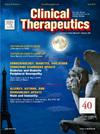The Totality of Evidence for SDZ-deno: A Biosimilar to Reference Denosumab
IF 3.2
4区 医学
Q2 PHARMACOLOGY & PHARMACY
引用次数: 0
Abstract
Purpose
Sandoz biosimilar denosumab (GP2411 [SDZ-deno]; Jubbonti/Wyost) is approved by the US FDA, EMA and Health Canada for all indications of reference denosumab (REF-deno; Prolia/Xgeva), a fully human IgG2κ monoclonal antibody that binds with high affinity and specificity to receptor activator of nuclear factor kappa-B ligand (RANKL). Denosumab blocks RANKL, preventing bone resorption and loss of bone density/architecture in conditions characterized by excessive bone loss such as osteoporosis in postmenopausal women and metastatic bone disease, among others.
Methods
This narrative review summarizes the totality of evidence (ToE) for SDZ-deno that supported its approval as Jubbonti/Wyost in the EU and US.
Findings
Analytical evaluation indicated that SDZ-deno has high purity and structural homology with REF-deno. SDZ-deno also demonstrated similar binding affinities, size and charge variants, and disulfide isoforms to REF-deno, and did not trigger clinically meaningful antibody-dependent cellular cytotoxicity. In clinical evaluation, SDZ-deno was similar to REF-deno in pharmacokinetics (PK) and pharmacodynamics (PD) in a 39-week Phase I study in 502 healthy male participants, and to REF-deno in a 72-week Phase III study in 527 postmenopausal women with osteoporosis. In both studies, the 90% and 95% confidence intervals (for PK and PD endpoints, respectively) of the geometric mean ratios for AUCinf, Cmax (and AUClast in the Phase I study; PK endpoints), and area under the effect versus time curve of percent change from baseline in serum carboxy-terminal crosslinked telopeptide of type I collagen (PD endpoint), were fully contained within the prespecified equivalence margins (0.80, 1.25). The Phase III study also demonstrated SDZ-deno is similar in efficacy to REF-deno in postmenopausal women with osteoporosis, as the difference in percent change from baseline in lumbar spine bone mineral density at week 52 between REF-deno and SDZ-deno was fully contained within the prespecified equivalence margins (−1.45, 1.45). SDZ-deno was well tolerated in both studies. As the ToE has established biosimilarity of SDZ-deno and REF-deno, extrapolation to all indications is justified based on the common mechanism of action and the comparable PK, safety, and immunogenicity across all indications.
Implications
The ToE for SDZ-deno suggests it will be an effective biosimilar to REF-deno, and its lower unit price is anticipated to increase the number of appropriate patients who will benefit.
SDZ-deno:地诺单抗的生物类似药。
目的:山道士生物仿制药地诺单抗(GP2411 [SDZ-deno];Jubbonti/Wyost)已获美国 FDA、EMA 和加拿大卫生部批准,可用于参照药地诺单抗(REF-deno;Prolia/Xgeva)的所有适应症,地诺单抗是一种全人 IgG2κ 单克隆抗体,能以高亲和力和特异性与核因子卡巴-B 配体受体激活剂(RANKL)结合。地诺单抗可阻断 RANKL,防止骨吸收和骨密度/骨结构的丧失,用于治疗骨质流失过多的疾病,如绝经后妇女的骨质疏松症和转移性骨病等:本综述总结了支持 SDZ-deno 在欧盟和美国作为 Jubbonti/Wyost 获得批准的全部证据(ToE):分析评估表明,SDZ-deno与REF-deno具有很高的纯度和结构同源性。SDZ-deno还表现出与REF-deno相似的结合亲和力、大小和电荷变异以及二硫异构体,并且不会引发具有临床意义的抗体依赖性细胞毒性。在临床评估中,SDZ-deno与REF-deno的药代动力学(PK)和药效学(PD)相似,前者在502名健康男性参与者中进行了为期39周的I期研究,后者在527名绝经后骨质疏松症妇女中进行了为期72周的III期研究。在这两项研究中,AUCinf、Cmax(在I期研究中为AUClast;PK终点)和血清I型胶原羧基端交联端肽从基线变化百分比的效应与时间曲线下面积(PD终点)的几何平均比值的90%和95%置信区间(分别为PK和PD终点)完全包含在预先规定的等效范围内(0.80,1.25)。III期研究还证明,SDZ-deno对绝经后骨质疏松症妇女的疗效与REF-deno相似,因为REF-deno与SDZ-deno在第52周时腰椎骨矿物质密度与基线相比的百分比变化差异完全控制在预先设定的等效范围内(-1.45,1.45)。在这两项研究中,SDZ-deno 的耐受性良好。由于ToE已经确定了SDZ-deno和REF-deno的生物相似性,因此根据所有适应症的共同作用机制以及可比的PK、安全性和免疫原性,外推至所有适应症是合理的:SDZ-deno的ToE表明,它将成为REF-deno的有效生物类似药,而且其较低的单价预计将增加受益患者的数量。
本文章由计算机程序翻译,如有差异,请以英文原文为准。
求助全文
约1分钟内获得全文
求助全文
来源期刊

Clinical therapeutics
医学-药学
CiteScore
6.00
自引率
3.10%
发文量
154
审稿时长
9 weeks
期刊介绍:
Clinical Therapeutics provides peer-reviewed, rapid publication of recent developments in drug and other therapies as well as in diagnostics, pharmacoeconomics, health policy, treatment outcomes, and innovations in drug and biologics research. In addition Clinical Therapeutics features updates on specific topics collated by expert Topic Editors. Clinical Therapeutics is read by a large international audience of scientists and clinicians in a variety of research, academic, and clinical practice settings. Articles are indexed by all major biomedical abstracting databases.
 求助内容:
求助内容: 应助结果提醒方式:
应助结果提醒方式:


